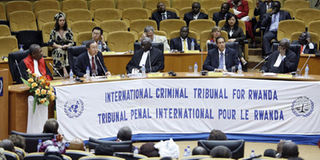COVER: After $2bn cheque, is ICTR a success story?

UN Secretary General Ban Kii Moon addresses the International Criminal Tribunal for Rwanda. PHOTO | FILE
What you need to know:
- As the ICTR’s mandate comes to an end there is another unresolved issue – dozens of the former suspects acquitted or freed after serving their sentences have nowhere to go
Arusha. The International Criminal Tribunal for Rwanda (ICTR) may still be hunting down some of the most wanted individuals indicted or alleged to have taken part in the 1994 genocide in Rwanda which claimed the lives of nearly a million people.
In fact, administrators of the Tribunal say failure to apprehend a small group of those still at large, including the alleged mastermind Felicien Kabuga, was causing much concern. In some quarters, the Tribunal’s job is considered unfinished without them being arrested and charged like others.
But as ICTR’s mandate comes to an end there is another unresolved issue; dozens of the former suspects acquitted or freed after serving their sentences have nowhere to go for lack of a host country since they fear for their lives once they get back home.
Eleven of them are still accommodated in a ‘safe house’ in Arusha because no country, among a host of them approached on several occasions, has agreed to accept them. They also lack travel documents.
The Tribunal Statute places an obligation on UN member states to cooperate in the arrest and transfer of ICTR accused persons, but says nothing about acquitted persons and those who have served their sentences.
However, that does not water down the achievements made by the Tribunal which was set up by the United Nations Security Resolution 955 of November 8, 1994 and which must close its doors by the end of next month at the latest, according to a calendar set by the UN.
Since it started trials in 1996/1997, the ICTR has convicted 61 people - of whom seven are still on appeal - and acquitted 14 others, of whom only six have found host countries. Some trials have been relocated to Kigali, Rwanda from Arusha.
Establishing the Tribunal in Arusha from scratch was not without challenges. But according to the Vice President Dr Mohamed Gharib Bilal, who was a guest of honour during last week’s 20th commemoration of ICTR, there is no contention that the Tribunal has contributed to the development of the International Law.
“During its mandate, the Tribunal served both as a research, learning and educational centre for many universities across the world, colleges, high schools, local and international courts in the area of International Criminal Justice”, he told a gathering during the commemoration at the Arusha International Conference Centre (AICC).
The Tribunal is reported to have prepared a soft copy of all proceedings, judgements and appeals for all the cases it had handled for the last two decades. Dr. Bilal described this as “yet another indelible contribution of ICTR in the development of International Criminal Justice”.
He added; “Two decades after the infamous genocide in Rwanda, we cherish not only the role played by ICTR in ending impunity but also salute all innocent men and women who fell victim to irresponsible extremist senior government officials who planned and administered the genocide”.
He said it was the conviction of Tanzania that the planned, organised and coordinated killing of innocent civilians based on their ethnicity “will never happen in Africa. Africa and the world at large should feel ashamed of killing one another”.
ICTR Registrar Mr Bongani Majola recalled criticisms which have been directed at ICTR and similar tribunals on the premise that international tribunals cannot stop politically-driven mass violence. The Arusha-based Tribunal was established by the UN Security Council Resolution 955 after it determined that the situation in Rwanda constituted a threat to international peace and security.
For instance, some academics observed last year that part of the legacy of the ICTR was that it has failed to bring about reconciliation in Rwanda even though the mandate of the Security Council does not charge the Tribunal with that responsibility.
But he insists that ICTR has been a success story on the premise, supported by the International Centre for Transitional Justice, that investigations and trials of powerful leaders - be they political or military - helps to strengthen the rule of law and sends a strong message that such crimes will no longer be tolerated.
“The mandate of ICTR is to do just that, namely to prosecute and punish those most responsible for genocide in Rwanda in 1994, If judged on the basis of this mandate, there is no doubt that the ICTR has been greatly successful experiment”, he pointed out.
In the 20 years of its existence, the ICTR indicted 93 persons. So far 55 convictions and 14 acquittals have been registered in finalized cases. There are a further seven persons who were convicted at the trial level but who are waiting the completion of their appeals in two cases, one of which is now under the jurisdiction of the Residual Mechanism for International Criminal Tribunals, which will take over the remaining activities of the Tribunal.
Cases against ten were referred to national jurisdictions for trial and a further three were taken over by the Mechanism, according to the Prosecutor who added; “ Two accused persons died before the completion of their trials while indictment against another two were withdrawn”.



